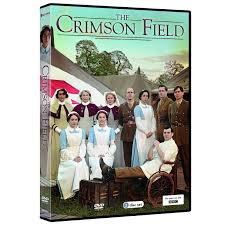
The Crimson Field is the new period drama set to grace our TV screens on Sunday evenings. Set during the Great War, it follows the lives of three girls who have volunteered to serve in a field hospital in Northern France. I've been looking forward to seeing this and can't wait for Sunday. This year as you know is the 100th year since the Great War began.

The drama, by Sarah Phelps, presents one of the untold stories of the war. From a field hospital in France, the Army doctors, nurses and volunteers work to heal the physical and psychological wounds of the soldiers. Shell shock was indeed
recognised and diagnosed, but for those who could not escape its grip, it could be damning. It's the psychological scars that were perhaps considered controversial at the time, because for many such men, they would be labelled as having 'lack of moral
fibre.' Some men were put on trial for military crimes such as desertion and cowardice, with a number paying the ultimate price -death by firing squad. Such mental effects were simply not understood at the time or were quickly dismissed, especially when men were desperately needed to fight. In 1916, at the Battle of the Somme, it was estimated that around 40% of the casualties were suffering the effects of shell shock.
The Author, Pat Barker addresses the psychological effects of warfare in her books, 'The Regeneration Trilogy,' which introduces the reader to the real life poets and soldiers of the Great War, Siegfried Sassoon, Wilfred Owen and Robert Graves. Barker recreates the Great War period and portrays the effects of war and the resultant psychological destruction in such a fascinating and illuminating way. War is certainly not glorious and its ugliness is portrayed in places in all its goriness. These books are definitely worth reading if you have any interest at all in the Great War.

Comments
Post a Comment